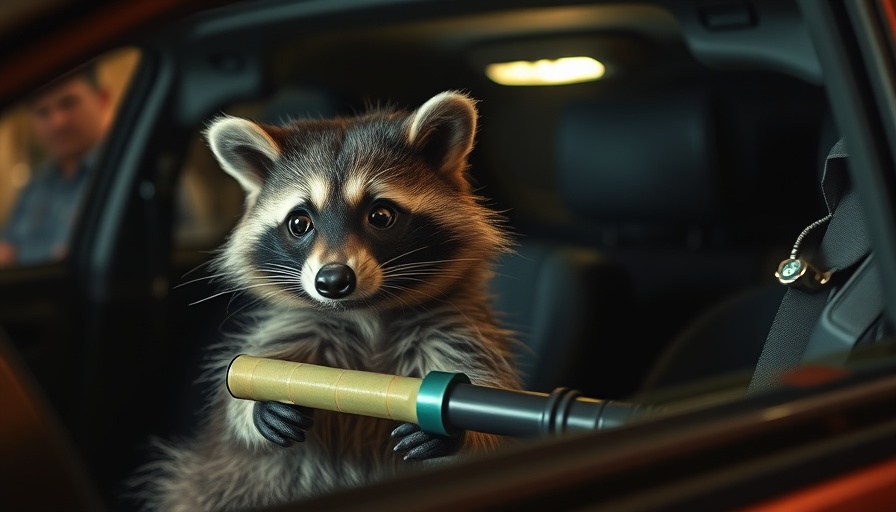
Raccoon Chewy: A Peculiar Encounter with Law Enforcement
In a bizarre incident during a traffic stop, a raccoon named Chewy was found with a meth pipe in his mouth, turning a routine check-up into an unusual spectacle. This encounter unfolded when officers stopped a driver in Ohio for allegedly operating a vehicle with a suspended license. While inspecting the vehicle, officers uncovered not only Chewy clutching the pipe, but also a cache of illegal substances including meth and cocaine.
In 'Raccoon found with meth pipe in driver's seat during police stop, woman arrested,' the discussion dives into the unorthodox intersection of pet ownership and substance abuse, prompting us to analyze its implications further.
The Legal Quagmire of Keeping Wild Animals as Pets
This incident raises questions about the legality and ethics of keeping wild animals as pets, especially in Ohio where raccoons can be legally owned. While state law permits this, the circumstances of Chewy’s discovery might hint at a much darker reality of animal welfare. The juxtaposition of a seemingly adorable pet holding a drug paraphernalia and the serious implications of substance abuse poses a complex narrative that hearkens to the red flags about humane treatment in non-traditional pet ownership.
A Sobering Narrative: The Impact of Substance Abuse
While this story might evoke laughter in some due to its oddity, it’s important to consider the grim implications of the substance abuse problem that surrounds it. Chewy's encounter with the illicit drugs sheds light on an ongoing crisis affecting countless families and communities. The consequences of addiction extend beyond human lives, impacting pets who unintentionally become entwined in their owners’ struggles.
Pop Culture References: From 'Cocaine Bear' to Raccoon Tales
The mention of Chewy inevitably brings to mind the pop culture phenomena like 'Cocaine Bear,' which portrays the absurdities of animals interacting with narcotics. The absurdity of these narratives often drowns out the more profound conversation about addiction and its fallout, raising the question of whether comedic portrayals in film can lead to a trivialization of serious issues.
Community Reflection: What This Means for Pet Owners
This incident has reignited conversations about pet ownership, particularly regarding wild species. Pennsylvania residents should reflect on the responsibilities that come with caring for unconventional pets. There is an inherent risk in adopting animals such as raccoons, which, despite being endearing, carry substantial care needs and potential health risks. Individuals keen on owning such pets must be educated on the ramifications of their choices, not only on personal wellbeing but also their pets' welfare.
Looking Ahead: Support and Resources for Substance Abuse
As we process the peculiarities of Chewy's situation, it's vital to acknowledge the pathways available for individuals facing addiction. Resources are out there for both human and animal welfare, and Pennsylvania communities must prioritize educational campaigns that inform residents about substance abuse prevention and the complexities involved in animal care. Organizations focusing on rehabilitation can provide a way to address substance issues proactively while fostering a nurturing environment for both humans and pets.
Final Thoughts: Moving From Headlines to Hope
While Chewy's experience might seem trifling, it symbolizes a crucial intersection of pet ownership and substance abuse realities. It compels us to engage in community dialogue about responsible animal ownership, which extends beyond mere legality to encompass moral responsibility for all beings in our care. As residents of Pennsylvania, let us advocate for informed choices that promote a healthier, more compassionate society for all.
 Add Row
Add Row  Add
Add 




 Add Row
Add Row  Add
Add 

Write A Comment